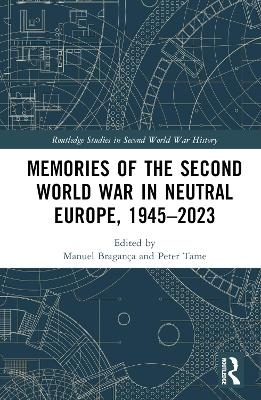
Memories of the Second World War in Neutral Europe, 1945–2023
Routledge (Verlag)
978-0-367-71517-5 (ISBN)
This edited volume is a sequel to, and a development of, The Long Aftermath: Cultural Legacies of Europe at War, 1936–2016 (2016). It focuses on the six major European countries and states that remained officially neutral throughout the Second World War, namely Ireland, Portugal, Spain, Sweden, Switzerland, and the Vatican.
Its transnational, comparative, and interdisciplinary approach addresses complex questions pertaining to collective remembrance, national policies and politics, and intellectual as well as cultural responses to neutrality during and after the conflict. The contributions are from a broad range of scholars working across the disciplines of history, literature, film, media, and cultural studies. Their thought-provoking chapters challenge many assumptions about neutrality in the post-war European and global context, thereby filling a gap in the existing scholarship.
Common themes that run through the volume include the intertwined and dynamic links between neutrality and moral responsibility during and after the Second World War, the importance of memory politics and popular culture in shaping collective memories, and the impact of the Holocaust in shifting traditional perspectives on neutrality since the 1990s. This volume will be of interest to undergraduates, postgraduates, scholars interested in the field of memory studies, as well as non-specialist readers.
Manuel Bragança is an Assistant Professor in the School of Languages, Cultures and Linguistics at University College Dublin. His publications include The Long Aftermath (2016, with Peter Tame), Ego-Histories of France and the Second World War (with Fransiska Louwagie, 2018), and Hitler’s French Literary Afterlives (2019). Peter Tame is an independent researcher, specialising in twentieth-century French literature and ideology. His principal publications include The Ideological Hero (1998), Isotopias: Places and Spaces in French War Fiction of the Twentieth and Twenty-First Centuries (2015), Mnemosyne and Mars (2013), and The Long Aftermath (2016).
Foreword: The search for neutrality in wartime. Introduction: European neutrals in World War II and after: A balancing act Section I: Ireland / Éire. 1. ‘No useful purpose’? The Government Information Bureau (GIB) and Irish neutrality 2. Forgotten Volunteers? Remembering and Recognising veterans of the Second World War in the Republic of Ireland 3. The Emergency’s Improbable Frequency in Contemporary Irish Culture. Section II: Portugal. 4. Portugal, World War II refugees and the Holocaust. History and Memory 5. Portuguese Memorials of World War II, between Remembrance and Oblivion 6. Memory works: The Changing Faces of Portugal’s Neutrality in recent Portuguese feature films and documentaries (1992-2017). Section III: Spain. 7. Diplomats in the fray. The struggle to establish the legacy of Spanish foreign policy during the Second World War 8. From Sepharad to the Judeo-Masonic Conspiracy. Facts and Fictions on Spain and the Holocaust 9. Neutrality of Spain in World War II: The Filmic Construction of a Myth. Section IV: Sweden. 10. Archives on Victims of Nazism in Sweden: From Oral History to Cultural Memory or Oblivion 11. Sweden, the War and the Holocaust in post-war memory 12. On remembrance and forgetting: the Second World War in Swedish memory culture. Section V: Switzerland. 13. Switzerland and its neutral stance during World War II: a past that won't go away 14. Memorials of World War II and the Holocaust in Switzerland 15. Switzerland: The Policy of Neutrality and the Uses and Abuses of World War II Memory. Section VI: The Vatican. 16. The papacy, the Catholic World, and the memory of the Second World War 17. Vatican diplomacy on the razor’s edge: preserving neutrality and ecclesiastical heritage sites in Italy during World War II 18. Telling children of neutral spaces in occupied Rome. Memories of the Church, the Pope, and persecution. Afterword: The Shadow of the Second World War on Neutral Europe.
| Erscheinungsdatum | 14.12.2023 |
|---|---|
| Reihe/Serie | Routledge Studies in Second World War History |
| Zusatzinfo | 18 Halftones, black and white; 18 Illustrations, black and white |
| Verlagsort | London |
| Sprache | englisch |
| Maße | 156 x 234 mm |
| Gewicht | 800 g |
| Themenwelt | Geschichte ► Allgemeine Geschichte ► Neuzeit (bis 1918) |
| Geschichte ► Allgemeine Geschichte ► 1918 bis 1945 | |
| Geisteswissenschaften ► Geschichte ► Regional- / Ländergeschichte | |
| Geschichte ► Teilgebiete der Geschichte ► Militärgeschichte | |
| Sozialwissenschaften ► Politik / Verwaltung | |
| ISBN-10 | 0-367-71517-1 / 0367715171 |
| ISBN-13 | 978-0-367-71517-5 / 9780367715175 |
| Zustand | Neuware |
| Informationen gemäß Produktsicherheitsverordnung (GPSR) | |
| Haben Sie eine Frage zum Produkt? |
aus dem Bereich


